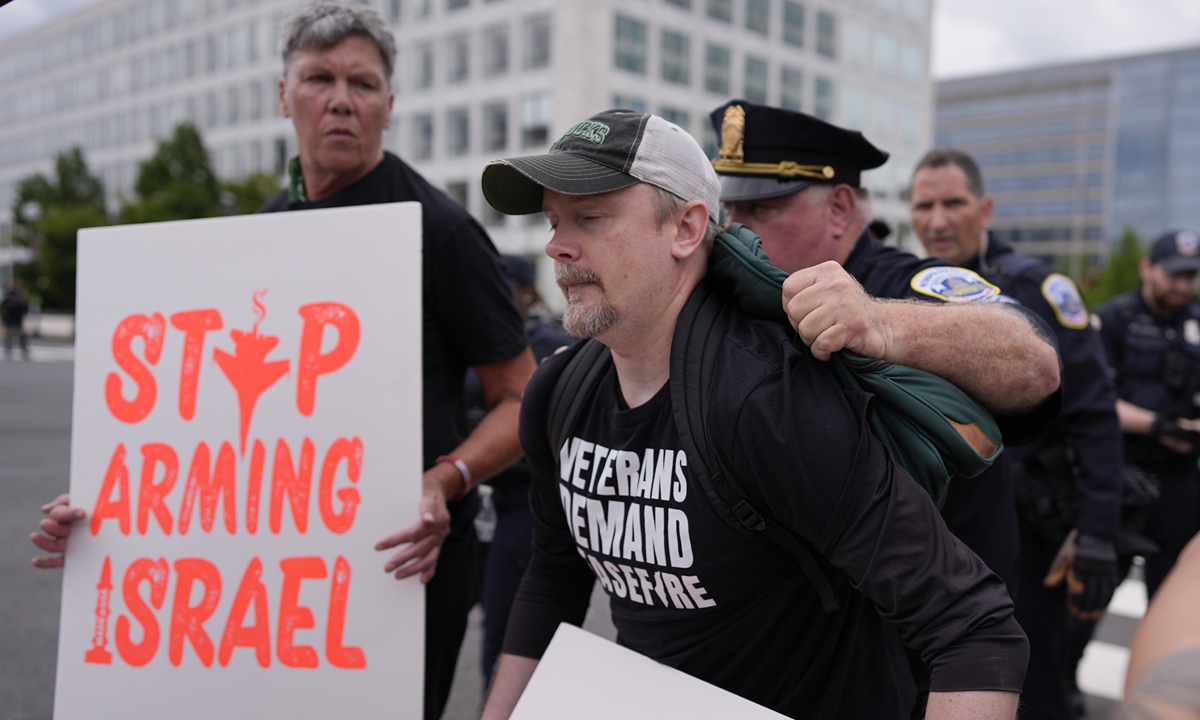Netanyahu's US trip a 'bet on both sides'
Middle East NATO very unlikely, 'as reconciliation process in region irreversible'

Washington Metropolitan Police clear demonstrators from blocking traffic on July 24, 2024, in Washington, ahead of a scheduled visit by Israeli Prime Minister Benjamin Netanyahu at the US Capitol. Thousands of protesters against the war in Gaza converged on Washington on the day to condemn Netanyahu's visit, according to US media. Photo: VCG
Israeli Prime Minister Benjamin Netanyahu's visit to the US is an attempt to show his supporters that Washington is still with him, and he is using this chance to "bet on both sides" as he is scheduled to meet with US President Joe Biden and likely Democratic nominee Vice President Kamala Harris, as well as former president Donald Trump, so that he can ensure that whoever eventually wins the election, the US will still back Israel despite its operation in Gaza already killing nearly 40,000 Palestinian people.
Chinese experts said on Thursday that Trump is now taking advantage after Democrats just changed their candidate, which may be a favorable development to Netanyahu, as Trump will be even more tolerant of Israel's operation in Gaza. However, Netanyahu's call to build a "Middle East NATO" is unlikely to happen as Iran and Arab countries have fixed their ties and the reconciliation trend in the region is irreversible, adding that Iran is now governed by moderate reformists, so regional countries are unlikely to see it as a threat, but they are concerned about the spillover effect of the Gaza crisis.
Purpose of visit
During his address to the US Congress, Netanyahu lashed out at protests against Israel's ongoing war in Gaza, broadly disparaging anti-Israel protesters as "Iran's useful idiots," CNN reported on Wednesday.
The Israeli prime minister's nearly hour-long address to Congress struck a bellicose tone as he vowed to "fight until we achieve victory." Netanyahu falsely downplayed and deflected on the role of Israel in causing the ongoing civilian strife in Gaza. Although he made some reference to efforts to bring the hostages home, significantly more of the speech focused on the ongoing war and took aim at his foes - Iran, the International Criminal Court and protesters, said the CNN report.
Liu Zhongmin, a professor at the Middle East Studies Institute of Shanghai International Studies University, told the Global Times on Thursday that since the outbreak of this round of the Palestine-Israel conflict, Israel has received widespread criticism worldwide and also pressure from the Biden administration for a cease-fire, but this time, Netanyahu is trying to use his visit to tell his people in Israel and the world that Washington is still with him, and that he is able to meet with Biden and Trump, and also may hope the US presidential election to come out with a favorable result for Israel.
According to AP, Netanyahu's popularity has plummeted at home, and the visit — at least originally — was seen as giving him a chance to show himself as a global statesman, welcomed by the lawmakers and leaders of Israel's closest ally and the world's only superpower.
However, the US has seen protests across the country on college campuses and elsewhere in opposition to Israel's war in Gaza. On the day of Netanyahu's speech, there were protests both outside and inside the US Capitol complex. Additionally, the Secret Service is investigating reports that protesters gained access to the hotel building where Netanyahu is staying in Washington, DC, releasing bugs in the hotel and pulling fire alarms, according to a source familiar with the matter, CNN reported.
US House Speaker Mike Johnson helped bring about Netanyahu's address to lawmakers, highlighting firm Republican support for the Israeli leader. Netanyahu has had tense relations with Biden despite the administration's military and diplomatic support for Israel's war, AP reported.
Experts said that Republicans and Democrats held very different stances over the Israel-Palestine conflict. Although both parties continue to support Israel, Democrats are showing more sympathy for Palestine as they need to win support from immigrants and left-wing voters, while Republicans are much closer to Israel and almost unconditionally supporting its operation in Gaza regardless of how many Palestinian civilians get killed.
As a result, Netanyahu and his supporters in Israel will definitely welcome a Republican victory at the election at the end of this year, analysts noted.
Biden and Netanyahu are expected to meet Thursday, while Trump agreed to a Friday meeting with the Israeli leader, the AP reported.
Wang Jin, an associate professor at the Institute of Middle Eastern Studies at Northwest University in Xi'an, told the Global Times that the Palestine-Israel issue is not a hot topic in the US presidential election for most US voters, as most Americans care more about topics like the economy and immigrants, while the Middle East issue is just one part of US foreign affairs, so Netanyahu's visit will have a very limited impact on the US presidential election.
Middle East NATO?
Apart from building ties with different forces in Washington, the Israeli prime minister is also trying to make US elites share his narrative shaping Iran as the biggest threat in the region.
Netanyahu has proposed the creation of a new military bloc modeled after NATO called the "Abraham Alliance," aimed at Iran, RT reported. Netanyahu spoke before the joint session of the US Congress on Wednesday in his fourth address to American lawmakers, beating Winston Churchill's record, although about 70 House and Senate members declined to attend for various reasons, according to the RT report.
"America forged a security alliance in Europe to counter the growing Soviet threat," Netanyahu said at one point. "Likewise, America and Israel today can forge a security alliance in the Middle East to counter the growing Iranian threat," the report said.
According to the Israeli media outlet Jewish News Syndicate, the Israeli prime minister thanked US President Joe Biden "for bringing that alliance together." In a briefing with the Israeli press delegation after his congressional speech on Wednesday afternoon, Netanyahu compared such a cohort to a "NATO-style alliance." During the address, he said the unified group "would be a security coalition in every sense of the word."
Liu said Netanyahu's idea is unlikely to be realized, because at present, with the help and mediation of China, ties between Iran and Saudi Arabia, as well as other Arab countries, have already been fixed and reestablished, and the reconciliation process among Muslim countries in the Middle East is irreversible, adding that Teheran is now ruled by moderate reformists that are less hostile to the West, so Netanyahu's attempt to spread fear over Iran among other regional countries won't succeed.
Nowadays, Arab countries are being more concerned about the Gaza crisis and due to Israel's tough stance and endless military actions, the crisis has now spilled over into other countries such as Lebanon and Yemen, so it's unthinkable that regional countries would be willing to join a military alliance with Israel, said Liu.


